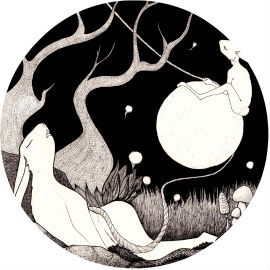
Tiziano (Titian) Vecellio’s Girl in a Fur (sometimes called Woman in a Fur Coat). c 1535-38. Currently hanging in the Kunsthistorisches Museum, Vienna. Once owned by the sculptor Pompeo Leoni. Acquired by Charles I in Spain from the Count of Villamediana, and sold to Mr Murray in 1650 for £100. Recorded in Austria from 1730.
for Darryl Chalk
Fracastoro blamed the gown. Veronese, it was, and furred.
Centuries later Mead, the gentle physic, wrote that furrs, feather, silk, hair, wool, cotton, flax* could imprison and release contagion. But back then, the men were fools, and nothing so precious as my fur could be burned.
One after another they donned the gown and died. Five and twenty men, maybe more. No pestilential seed, no breath of stars, no curse whispered in the dark. But this fur, once the skin of a great beast that roamed the frozen north. Dark, and warm, and supple.
It was my gown — that part no physic knew — the curse I placed upon myself to stop my father’s loving hand. Donkeyskin, they called me. Bearskin, more like.
When the painter came, brushes in hand, I let the fur fall open. Let him see the pearls and gold in my hair. That other pearl, too.
When he begged to capture me on his canvas: to lay red glazes on my mouth, white lead on my flesh, I knew the very cost. Every lira, every lie. At the end of each day we would spread the fur on the ground and lay ourselves down. I could almost hear her breathing, that other self we played upon.
When it was done, he pulled the skin up over me again. I roared my pestilential roar. Raked my claws across the boards. But he was done.
This is love, then, I thought. My revenge would taste of blood and darkness. Sweet, it would be, and long.
*
*From Richard Mead’s A Short Discourse Concerning Pestilential Contagion: And The Methods to Be Used to Contain It. London. Sam Buckley and Ralph Smith. 1720. pp17-18. Available from Eighteenth Century Collections Online.
**Titian died of the plague on 27 August, 1576

No Comments